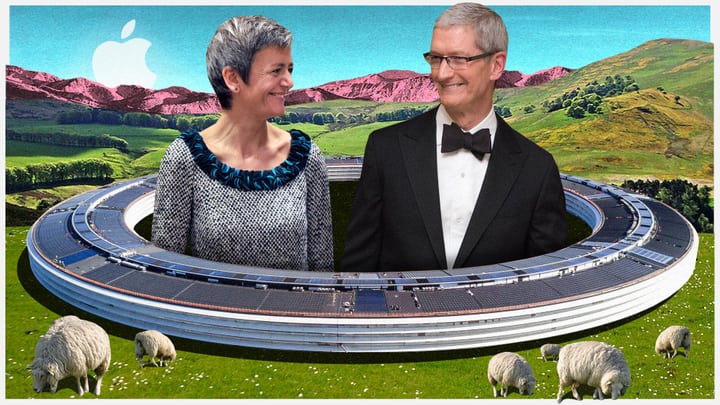A New Home
Corresponding with lawyers isn’t always the most pleasurable of experiences, but this particular email bore the magic word directly in the subject line: “Apple.”
The message was from one of the biggest law firms in the world, Baker McKenzie, and it smelled of money. Inside was an invitation to submit a fee proposal. The attachment, the sender noted, included a few questions from “our client, Apple.” A manager at the receiving end exulted: “This is a tremendous opportunity.”
The questions posed by Apple in the attachment were hardly run-of-the-mill queries. Indeed, they revealed quite a bit about practices Apple would rather keep secret. Apple’s law firm sent the email in early 2014, when Ireland was in the process of changing its corporate tax law. It was a stressful time for the company. After all, the iPhone-maker’s subsidiaries also book their profits from European sales in Ireland, which has the special charm that corporate tax rates are particularly low there.
The Paradise Papers show how purposeful, and at times brazen, companies can be in their hunt for just the right mix of laws that won’t interfere with their way of doing business. They also illustrate how easy tax havens make it for companies to obey the few legal regulations they do have.
“Is it possible to obtain an official assurance of tax exemption?” Excerpt from the Paradise Papers
The questions submitted by Apple read as though the company feared its tax bills might increase in the future. They suggest Apple was exploring whether to establish bases in tax havens. It had a few places in mind, all of which were known more for their tax laws than their IT experts. These included the British Virgin Islands, the Cayman Islands, the Isle of Man and two Channel Islands, Guernsey and Jersey. But the conditions had to be just right, the email made clear. Apple wanted to be sure it could conduct management activities there “without being subject to taxation in your jurisdiction.” The company also wanted official confirmation. “Is it possible to obtain an official assurance of tax exemption?” Apple inquired through Baker McKenzie about how transparent it would need to be in the tax havens as well. “What information has to be filed periodically?” it asked, and: “What information is publicly visible?”
It’s not every day that a global corporation is so openly brazen about its business practices and interests.

The documents make clear that Apple was also concerned about the political climate in the tax haven where it wanted to plant its flag. The company asked whether an opposition party could one day get elected. Perhaps because it might take a stance against low taxes? Nonetheless, Baker McKenzie inquired on Apple’s behalf: "Is there a credible opposition party or movement that may replace the current government?" Apple, it seemed, was concerned about a political awakening in the tax havens. Indeed, the company appeared to be on the lookout for a country in which nothing at all would get in the way of business. A place with no state interference, no politics and no public scrutiny.
U.S. corporations rushed to beat the deadline to set up a "Double Irish"
Apple has plenty of experience with political headaches. In 2013, a Congressional investigative committee lifted the lid on the company’s tax practices in Ireland, with CEO Tim Cook grilled for hours by senators. The Irish government felt it had been pilloried as a tax haven and the Irish ambassador even wrote a letter of protest. In order to rid itself of the reputation of being a malevolent tax haven, the Irish finance minister announced reforms would be made. That meant that Apple’s tax trick would be eliminated, and along with it the notorious “Double Irish.” The new rules took effect in 2015: Ireland, the message seemed to be, was turning over a new leaf.
It also meant, however, that companies still interested in profiting from tax loopholes had to undergo significant restructuring in 2014. And it was worth doing so, because the Irish finance minister had opted for a generous transition period. Companies that set up a “Double Irish” in 2014 could continue using it until 2021. The Paradise Papers make it clear that U.S. companies rushed to beat the deadline. “At the end of 2014 a window of opportunity closes,” one law firm advertised, adding that there was still time to set up a “Double Irish.” U.S. companies that were quick enough would only have to pay between 5 and 7 percent in taxes, according to the document.
To establish a “Double Irish,” two companies must be registered in Ireland. One can be managed from outside the country – preferably, consultants advise, somewhere with a zero percent corporate tax rate. A place like Bermuda. According to Irish law before the change at the end of 2014, a company’s tax home was determined by where management was located and not where the company was incorporated. The end result was that profits, according to Irish law, no longer had to be taxed in Ireland – providing a channel for profits made in Europe to flow to a tax haven via Ireland.
Apple’s Ireland structure meant that no tax authority was ultimately responsible for money shifted to the country
Irish law only requires the other company to be active in Ireland. One leaked document shows just how easy it is to fulfil that proviso. The U.S. company has to rent office space and hire an Irish employee. In addition, the company needs a manager from the U.S. who becomes the director of the new Irish subsidiary. That person must then spend seven to 10 days in Ireland by the end of the calendar year. This is sufficient to be considered an Irish company director. The paper also includes a tip: The best strategy is to also have another director who is a “local,” someone who really does live in Ireland. Then the American executive wouldn’t have to always fly in for board meetings – he just had to be present for the first one. At least one board meeting had to take place before Dec. 31, 2014. There were also a few contractual details to iron out.
Apple’s Ireland structure meant that no tax authority was ultimately responsible for money shifted to the country. No state, no taxes. The European Commission, for its part, decided this was illegal. Apple has appealed the ruling and accused Brussels of miscalculating, which has resulted in a protracted legal conflict for which it will likely take years before the European Court of Justice issues a verdict. The Commission is demanding that Ireland collect 13 billion euros in back taxes – plus interest – from Apple. It views the so-called “advance pricing arrangements” as tantamount to unlawful state aid. The 13 billion euro fine is the largest the European Commission has ever demanded from a company, but Apple has the Irish government on its side. Dublin has also taken legal action against the European Commission decision, apparently out of concern that it has more to lose by tarnishing its attractiveness as a base for multinationals than it would gain from the payment of back taxes.
The EU examined Apple’s books from 2003 to 2014. The resulting 130-page European Commission report also notes that Apple began establishing new company structures in Ireland in early 2015. Apple informed the Commission of the change.
The tax rate for companies based in Jersey is zero percent
In 2014, the law firm Appleby – the recipient of Apple’s long list of questions – took the company on as a client. The Paradise Papers show that in 2015, Appleby listed two Apple subsidiaries as being based in Jersey. Laws on the island allow foreign companies to establish their tax residency there. According to the documents, the two Irish companies, Apple Sales International and Apple Operations International, were operated by Apple Trust Jersey Limited. The connection between Cupertino, where Apple’s headquarters are located, and the island between France and the United Kingdom has never been reported on before. The tax rate for companies based in Jersey is zero percent.
It remains unclear exactly how Apple uses its Jersey connection. Prior to publishing its report on Apple, the European Commission redacted details pertaining to the company’s restructuring. Doing so is standard practice to protect company secrets. In documents that Apple was required to file to the U.S. Securities and Exchange Commission, each of the Jersey-based companies is considered a “a significant subsidiary” of Apple. One possible explanation for the company’s presence in Jersey is that Apple wanted to quickly react to the Irish tax reform. Previously, Apple subsidiaries in Ireland, thanks to the trick outlined above, had been considered “stateless” from the perspective of tax law – they weren’t based anywhere at all. But that’s no longer allowed. It could be, then, that Apple’s homeless companies have now finally settled down – on the island of Jersey, where the tax rate is zero percent.
Those familiar with the procedure say that the end result of Apple’s restructuring is that not much has changed for the company. And in Apple’s publicly available financial information, there has indeed been virtually no change in the amount of taxes paid by the company since 2015. According to that information, Apple paid around 4 percent on profits made outside of the U.S. in both the years 2013 and 2014. In 2015, it was around 5 percent and approximately 6 percent in 2016. Fluctuations of that magnitude are common for international corporations.
"At Apple we follow the laws, and if the system changes we will comply,“ an Apple spokesperson said
When contacted for comment by the Süddeutsche Zeitung and German public broadcasters NDR and WDR, the company avoided discussing Jersey. “When Ireland changed its tax laws in 2015, we complied by changing the residency of our Irish subsidiaries,” a company spokesman wrote in an email response. “The changes we made did not reduce our tax payments in any country. In fact, our payments to Ireland increased significantly and over the last three years we've paid $1.5 billion in tax there – 7 percent of all corporate income taxes paid in that country.” Apple’s law firm, Baker McKenzie, said only: “As a matter of general policy, we do not comment on confidential client matters.” The law firm Appleby emphasized in a general statement that it only performs services for its clients that are “legitimate and lawful.”
And Apple? The company feels it has unfairly ended up in the public spotlight. “As the largest taxpayer in the world, we’ve paid nearly $34 billion in corporate income taxes over the past three years,” a spokesman wrote. The company had pre-tax earnings of more than $198 billion during that period, meaning it had a total corporate tax rate of around 18 percent. “We understand that some would like to change the tax system so multinationals’ taxes are spread differently across the countries where they operate, and we know that reasonable people can have different views about how this should work in the future. At Apple we follow the laws, and if the system changes we will comply.”


